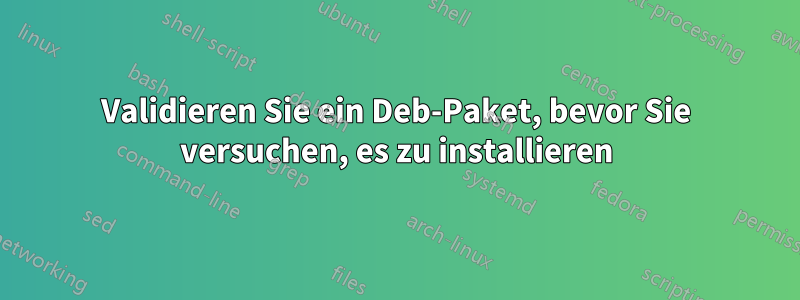
Kurz zusammengefasst Wie überprüfe ich, ob eine Deb-Datei vollständig und fehlerfrei ist?
Ich habe einen unvollständigen Download eines Deb-Pakets, bei dessen Installation ein Fehler auftritt. Bevor ich versuche, es zu installieren, möchte ich überprüfen, ob es gültig ist. Wie inSo überprüfen und validieren Sie ein Deb-Paket vor der Installation, ich kann es verwenden. dpkg-deb --info <deb file>Dies liefert jedoch alle Informationen, zeigt aber keine Fehler in meiner Datei an.
In meinem speziellen Fall habe ich die folgende Datei
# file is actually ~40MB, download the first 27MB
curl -r 0-28208916 https://download.docker.com/linux/ubuntu/dists/jammy/pool/stable/amd64/docker-ce-cli_20.10.21~3-0~ubuntu-jammy_amd64.deb
Das Folgende zeigt die Informationen des Debs, meldet aber keine unvollständige Datei
dpkg-deb --info docker-ce-cli_20.10.21~3-0~ubuntu-jammy_amd64.deb
Ausgabe vom Befehl dpkg-deb,
new Debian package, version 2.0.
size 28208917 bytes: control archive=5436 bytes.
1059 bytes, 24 lines control
14836 bytes, 195 lines md5sums
Package: docker-ce-cli
Source: docker-ce
Version: 5:20.10.21~3-0~ubuntu-jammy
Architecture: amd64
Maintainer: Docker <[email protected]>
Installed-Size: 145640
Depends: libc6 (>= 2.34)
Recommends: docker-scan-plugin
Conflicts: docker (<< 1.5~), docker-engine, docker-engine-cs, docker.io, lxc-docker, lxc-docker-virtual-package
Breaks: docker-ce (<< 5:0)
Replaces: docker-ce (<< 5:0)
Section: admin
Priority: optional
Homepage: https://www.docker.com
Description: Docker CLI: the open-source application container engine
Docker is a product for you to build, ship and run any application as a
lightweight container
.
Docker containers are both hardware-agnostic and platform-agnostic. This means
they can run anywhere, from your laptop to the largest cloud compute instance and
everything in between - and they don't require you to use a particular
language, framework or packaging system. That makes them great building blocks
for deploying and scaling web apps, databases, and backend services without
depending on a particular stack or provider.


